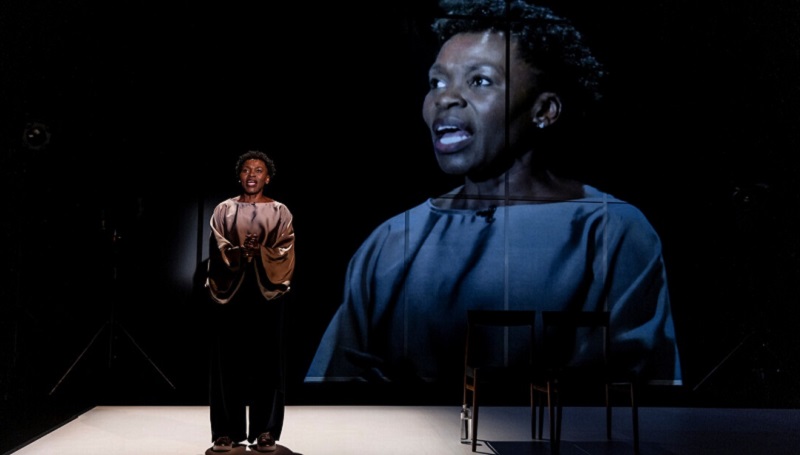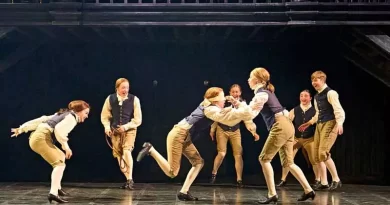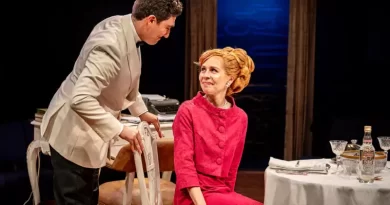“Mom, How Did You Meet the Beatles?” at Chichester Festival Theatre
Simon Jenner in West Sussex
21 June 2023
“I can’t believe you’re Laurence Olivier!” Thus Adrienne Kennedy addresses the actor as she recalls a breathless introduction. Her 75-minute autobiographical 2008 play Mom, How Did You Meet the Beatles? opens at Chichester’s Minerva Theatre for three weeks, directed by Diyan Zora.
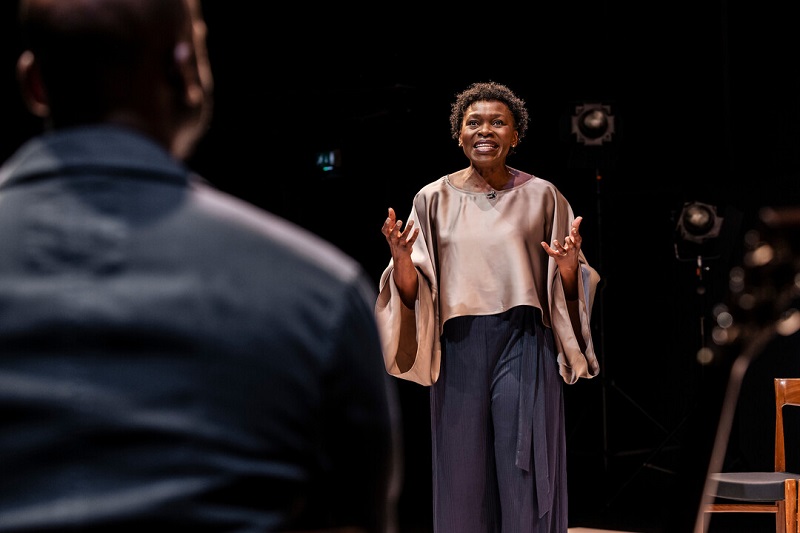
Jack Benjamin and Rakie Ayola.
Photo credit: The Other Richard.
Kennedy narrates how she was possessed of both star-struck wonder and – it’s clear – star-quality chutzpah. But that opening quote speaks too of her litanic style where it’s repeated twice more. Kennedy’s unique mosaics of repeated phrases, what Scott Brown in the programme (originally in the The New York Times Magazine) dubs her “fractal” mode of writing, have had a vast subterranean influence on Black American authors. Briefly flourishing but long out of fashion – partly for not being directly political enough – Kennedy is now re-emerging as a major voice.
Kennedy (Rakie Ayola) is gently prompted to witness remarkable moments in her own life, from early 1966 to late 1967, by her mostly silent, guitar-playing son Adam P. Kennedy (Jack Benjamin) who is also co-writer. He was, as a child, also there. Adam met nearly everyone referenced. Benjamin drifts evocatively through Robert Sword’s musical compositions. George Dennis’s more mundane London sounds waft like heady scent through the theatre.
Anisha Fields’s devastatingly simple set resembles a sound studio too, as if Adam needs to record his mother’s witness statement properly. A white stage floor is surrounded by black walls; a video camera teeters next to Adam who faces his mother diagonally downstage opposite where she uses one of two studio-style chairs. It’s as starkly compelling as that.
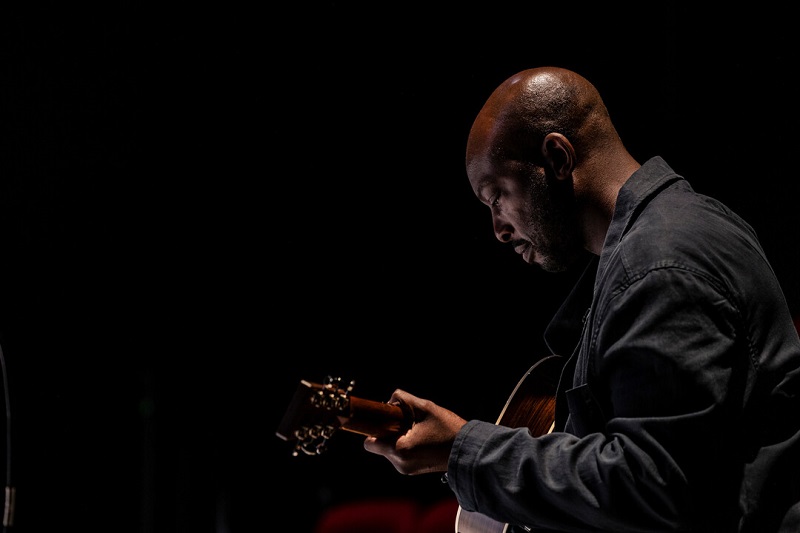
Jack Benjamin as Adam P. Kennedy.
Photo credit: The Other Richard.
Behind is a vast black video design by Hayley Egan. Mostly dormant, it leaps into selective life with footage from Kennedy’s past, often stills and rich colour footage of London in the Sixties. Occasionally flowers or some fleck of invoked image flares up but it’s discreet and not distracting from the narrator.
Kennedy’s near-monologue, sashaying in and out of memory, summarizes a time when, already an Obie-winning dramatist (born 1931) she decides to adapt John Lennon’s In His Own Write and head to England. Kennedy is like that: everything turns on a sudden decision, a desire, a whirligig of her own making. Nearly always her optimism seems justified too.
And Ayola inhabits this voice so intensely that it’s easy to believe Kennedy is speaking directly. In a rapid brightly-inflected delivery, looping round events and out again, Ayola occasionally bounces off Benjamin’s solid questions. As Adam, the almost silent anchor man, Benjamin just occasionally seems to rein Ayola’s narrative, nudge a correction, underscore a point.

Rakie Ayola as Adrienne Kennedy.
Photo credit: The Other Richard.
Kennedy is funded with a Rockefeller Grant and impending Guggenheim Scholarship – indeed she badgers them to confirm it three months prior to the official announcement. It will tide her over. With her alimony from a friendly divorce, $250 in cash and her son, Kennedy broaches, beards, brushes her way into swinging London using every contact she has.
She finds accommodation by asking her connections. She heads to Lennon’s publishers Jonathan Cape, secures a meeting with Victor Spinetti, Lennon himself then Ken Tynan and finally Olivier at the Old Vic. Ayola gently inflects Tynan’s clarion voice, the thrub of Olivier, Spinetti’s nasality, Lennon’s barely caught Liverpudlian undertone as he greets Kennedy who says: “This is Adam, my son.” “Hello Adam my son” Lennon returns deadpan. Tacitly, a play by Kennedy with Spinetti as co-writer seems to be thrashed out.
We – or rather Ayola – take in all the Beatles too, Adrian Mitchell, John Huston, and briefly James Baldwin with side glances at David Bailey and Natalie Wood. Even more such sinewy recall encapsulates qualities of the dramatist herself.
Each meeting seems almost a revelation in its intensity. The different encounters with Lennon: first and last with straggly hair and “granny” spectacles, morphing to Beatle and back. George Harrison in a quiet pink suit, being intellectual and so shy at a party that he stays in a corner room and never enters it. The friendly Ringo Starr. Dinners, combos of excited professionals and gracious stars. Friends who promise to get Elizabeth Taylor’s autograph on set but haven’t Kennedy’s … chutzpah.
The breathless looping seems like an ascending gyre too, towards that consummating moment when Kennedy’s co-authored piece will be put on at the National, then still at the Old Vic. There’s trouble in swinging paradise though. Kennedy fears that she is being written out and takes action.
That’s when she sees even more of Olivier. But each time she returns to that litanic opener. Kennedy can never get used to hearing that voice she knew from Gone with the Wind or Hamlet. Her mother, briefly passing through en route to Paris – we see briefly from where Kennedy inherits her positive force – is equally enthralled if only by report.
The same reasons we don’t hear of Kennedy militated against her too in the 1960s. Kennedy though better-known then wasn’t a star playwright “like Mailer”. Not a name one associates immediately with playwriting. Few though have her tenacity, her recall of detail which never falters; and her capacity, finally to set a more convincing version of events elsewhere faded. All because it’s Kennedy herself makes them remarkable: the synergy of her being as Adam puts it “at the centre of it” and yet airbrushed out.
With a preternatural ability to recall such detail, herself the centripetal force that brings such people together, Kennedy makes that brief foray at the National a far odder, serpentine thing: one inevitably bound to render her – so politely – inviable. British graciousness is a kind of dismissal, even by one’s idols.
Kennedy and Adam though rise to bless that episode too as one of the most fulfilling of their lives. Whatever conclusions we draw on how Kennedy herself has been treated, she remains creative, undiminished, still writing despite previous neglect. And in a truer sense than most, a huge influencer compared to the more mainstream Lorraine Hansberry and August Wilson or latterly Pearl Cleage. Kennedy has been likened to Beckett and hailed as the most boldly experimental Black writer alive by dramatists like Jeremy O. Harris, Branden Jacobs-Jenkins and Jackie Sibblies Drury.
It’s time though to see Kennedy’s more substantial work. This necessarily slighter piece – rich in many other ways – merely whets an appetite. The 20-minute film shown after a brief interval points to what we should see next.
.
.
~

